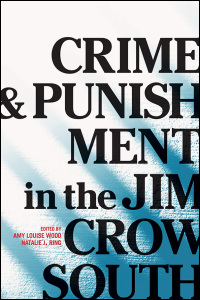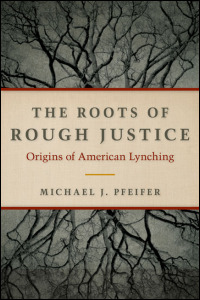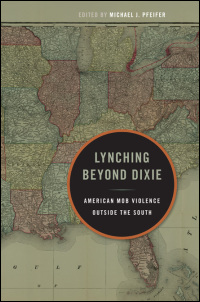This August marked the 400th anniversary of slaves arriving in America. To commemorate the anniversary, The New York Times Magazine launched the 1619 Project, a major initiative led by Nikole Hannah-Jones, with the goal of re-framing our understanding of the impact of slavery and recognizing the contributions of Black Americans to American democracy. The initiative has included a special issue of the magazine, podcasts, special events, a curriculum designed by the Pulitzer Center and more. Inspired by the 1619 Project, we’ve put together five lists of our publications related to the project on Black women’s activism, popular music, mass incarceration and lynching, sports and racism, and slavery, racism, and politics. As the year closes and a new decade beckons, we invite you to explore these lists alongside the 1619 Project and consider how we can use this important scholarship to move forward as a nation towards an antiracist future.
Mass Incarceration and Lynching Reading List
Spatiali zing Blackness: Architectures of Confinement and Black Masculinity in Chicago
zing Blackness: Architectures of Confinement and Black Masculinity in Chicago
By Rashad Shabazz
Shabazz highlights the racialization of space, the role of containment in subordinating African Americans, the politics of mobility under conditions of alleged freedom, and the ways black men cope with–and resist–spacial containment. A timely response to the massive upswing in carceral forms within society, Spatializing Blackness examines how these mechanisms came to exist, why society aimed them against African Americans, and the consequences for black communities and black masculinity both historically and today.
 All Our Trials: Prisons, Policing, and the Feminist Fight to End Violence
All Our Trials: Prisons, Policing, and the Feminist Fight to End Violence
By Emily L. Thuma
During the 1970s, grassroots women activists in and outside of prisons forged a radical politics against gender violence and incarceration. Thuma traces the making of this anticarceral feminism at the intersections of struggles for racial and economic justice, prisoners’ and psychiatric patients’ rights, and gender and sexual liberation. All Our Trials explores the organizing, ideas, and influence of those who placed criminalized and marginalized women at the heart of their antiviolence mobilizations.
Crime and Punishment in the Jim Crow South
Edited by Amy Louise Wood and Natalie J. Ring
Policing, incarceration, capital punishment: these forms of crime control were crucial elements of Jim Crow regimes. White southerners relied on them to assert and maintain racial power, which led to the growth of modern state bureaucracies that eclipsed traditions of local sovereignty. In this collection, Wood and Ring present nine groundbreaking essays about the carceral system and its development over time.
By Reiko Hillyer
This article analyzes the rise and fall of prison litigation by examining the case of Landman v. Royster, a class-action lawsuit launched by inmates at the Virginia State Penitentiary in 1969. In winning Landman, inmates challenged their status as “slaves of the state” and curtailed the unchecked despotism of prison officials.
The Roots of Rough Justice: Origins of American Lynching
By Michael J. Pfeifer
The Roots of Rough Justice tackles the emergence not only of the rhetoric surrounding lynching, but of its practice and ideology. Arguing that the origins of lynching cannot be restricted to any particular region, Pfeifer shows how the national and transatlantic context is essential for understanding how whites used mob violence to enforce the racial and class hierarchies across the United States.
Lynching Beyond Dixie: American Mob Violence Outside the South
Edited by Michael J. Pfeifer
Scholars have explored much of the history of mob violence in the American South, especially in the years after Reconstruction. However, the lynching violence that occurred in American regions outside the South, where hundreds of persons, including Hispanics, whites, African Americans, Native Americans, and Asian Americans died at the hands of lynch mobs, has received less attention. This collection of essays fills this gap by illuminating the factors that distinguished lynching in the West, the Midwest, and the Mid-Atlantic.
Living With Lynching: African American Lynching Plays, Performance, and Citizenship, 1890-1930
By Koritha Mitchell
Popular lynching plays were mechanisms through which African American communities survived actual and photographic mob violence. Mitchell shows that African Americans performed and read the scripts in community settings to certify to each other that lynching victims were not the isolated brutes that dominant discourses made them out to be. Instead, the play scripts often described victims as honorable heads of households being torn from model domestic units by white violence.
 Troubled Ground: A Tale of Murder, Lynching, and Reckoning in the New South
Troubled Ground: A Tale of Murder, Lynching, and Reckoning in the New South
By Claude A. Clegg III
Three black men were killed in front of a crowd of thousands in Salisbury, North Carolina, in 1906, following the ax murder of a local white family for whom the men had worked. Yet Clegg, an academic historian who grew up in Salisbury, had never heard of the case until 2002 and could not find anyone else familiar with the case. Clegg mines newspaper accounts and government records and links the victims of the 1906 case to a double lynching in 1902, suggesting a long and complex history of lynching in the area while revealing the determination of the city to rid its history of a shameful and shocking chapter.
Keep an eye out for the rest of our lists on popular music, and sports and racism, and make sure to check out previous lists on Black women’s activism and slavery, racism, and politics. You can find all the lists here.





